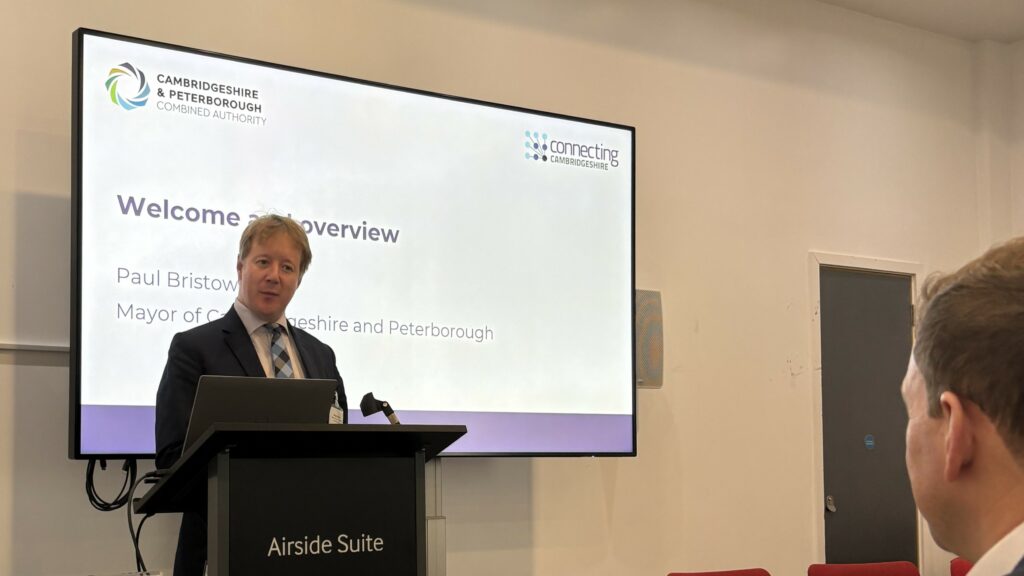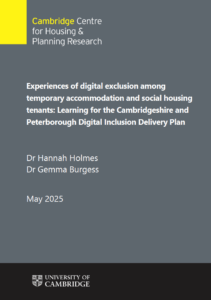New research reveals the hidden impact of Digital Exclusion in social housing and temporary accommodation

A newly released report sheds light on the deep and often invisible challenges faced by people living in social housing and temporary accommodation when it comes to accessing the digital world.
As vital public services including Universal Credit, healthcare, education and banking move increasingly online, being digitally excluded is no longer a minor inconvenience. It’s a growing barrier to everyday life, especially for those already facing housing instability, low income, or health challenges.
The research report, published by the Cambridge Centre for Housing and Planning Research (CCHPR), with support from Connecting Cambridgeshire and funded by the Policy Innovation Fund via the Centre for Science and Policy (CSaP) at the University of Cambridge, reveals that digital exclusion is not a fixed state. People move in and out of connectivity depending on factors like housing location, availability of public Wifi, or whether they share devices with others.
For those living in temporary accommodation, access to private, secure connectivity can be difficult. Many are forced to rely on free public access Wifi in libraries or shared public spaces to access critical services.
Without a stable connection or access to suitable devices, residents are often unable to manage bank or benefit accounts, access online health appointments, or communicate confidentially with support services. This lack of access can lead to missed appointments, loss of income, and heightened stress and anxiety.
For young people and adult learners, digital exclusion can also mean falling behind in school or being unable to complete coursework that requires internet access. Particularly where communication is handled solely via email or online portals.
The report highlights that even affordable solutions, such as social tariffs (discounted broadband packages for low-income households) are significantly underused – largely due to poor awareness and complex sign-up processes.
Location also plays a role, with rural placements creating a postcode lottery for digital access. Many residents expressed feeling overwhelmed by the digital world, especially if they lacked family or friends to guide them. Others noted the confusion and fatigue caused by disconnected support services that don’t collaborate effectively, leaving them unsure where to turn.
Will Plant, Digital Inclusion Lead for Connecting Cambridgeshire said: “Access to digital services is critical to living well in the modern world, yet for those in temporary or insecure housing, staying connected isn’t always straightforward. This research helps us understand where the gaps are and what we need to do to close them.”
“These findings will directly shape the delivery of the Cambridgeshire and Peterborough Digital Inclusion Delivery Plan. Connecting Cambridgeshire is strengthening its collaborative work with cross-sector partners including CCVS, PCVS, Sustainable Tech 4 Good, and Cambridgeshire ACRE to ensure support is joined-up, targeted, and informed by lived experience of those who are struggling to get online.”
Dr Hannah Holmes, lead researcher of the report, said: “Digital exclusion is rarely just about lacking a device or connection, it’s often intertwined with housing insecurity, poor health, and limited support networks.”
“Through this research, we’ve gained a deeper understanding of the lived experiences of people in temporary accommodation and social housing, and how digital barriers can compound existing inequalities. We hope these findings will help shape more responsive, inclusive services that meet people where they are.”
In response to the report, renewed focus will be placed on raising awareness of available support – including the National Databank and social tariffs – and making it easier for residents to access these resources through trusted community channels.
Connecting Cambridgeshire will also continue exploring ways to expand the CambWifi network – both indoors and outdoors – so people have more places to get online safely and reliably.
The findings will enable us to build partnerships with registered providers of temporary accommodation and social housing, to support the development of tailored, place-based services that empower residents to build digital confidence and skills in a way that works for them.
This report builds on previous research by CCHPR into the behavioural and motivational factors affecting digitally excluded residents, also commissioned by Connecting Cambridgeshire. Together, the reports offer a clearer picture of who is being left behind, and how we can help them catch up.
Related Posts

Connecting Cambridgeshire & CAPASP Join Cambridge United Foundation to support seniors with online safety

Plan to boost broadband speeds and mobile coverage gets backing from Combined Authority Board


